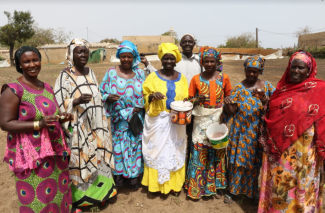Beer is a small town in the Thiès region, 70 km east of Dakar. Located in the Niayes, the main horticultural production area of Senegal, the village is home to many market gardens. Hundreds of men and women plough and dig their fields here throughout the year to produce vegetables and other crops.
Abdoulaye Diouf, 58 years old, owns a 1.5 ha plot of land. Despite a loss of 10 tons of vegetables, including 6 tons of potatoes and 4 tons of onions, during the previous season due to Covid-19 restrictions, he is a confident and enthusiastic man who continues his activities. The reason is the microdose, a new technology introduced in the area by the Dundël Suuf project that allows him to considerably reduce his expenses related to the purchase of fertilizers and to significantly improve his yields.
In Beer, Abdoulaye Diouf is a happy man. A farmer leader at the head of the Union of Market Garden Producers, Integrated Management of Producers and Predators (UPINGIPD), which has some 200 members. Father of eight children, the man who farms 12 months out of 12 thanks to a sprinkler irrigation system that he installed on his farm, is all smiles when he talks about the microdose he has just adopted. I am so happy to use this technology and everyone in Beer is enthusiastic today," says Diouf, adding that "all the producers in his association have shown interest in using the microdose.
We waste fertilizer. Instead of using 10 kg, for example, we usually use 50 kg. Our objective is to preserve our soils and increase yields, and this is what microdosing allows us to achieve at the same time,'' says Abdoulaye Diouf.
As an illustration, the farmer leader explains, 'I used to use up to 2 tons of fertilizer on my perimeter, which is 500,000 CFA francs just for fertilizer purchase expenses'. It is to reduce these expenses that Diouf and 150 other farmers in his group are fighting for the scaling up of microdose technology in their area. For any farmer, when you see your interest somewhere, you go without hesitation," says Diouf.
The introduction of the microdose in Beer and the Niayes is seen as a lifeline for many producers who are sometimes cornered by the financing institutions that grant them credit for the purchase of agricultural inputs every season. Thanks to the Feed the Future Senegal Dundël Suuf project, I got fertilizers and seeds," says the market gardener who believes that he will no longer need to go into debt to buy fertilizers with the substantial savings linked to the microdose.
This fertilization technique consists of putting small amounts (doses) of appropriate mineral fertilizers into the seed holes of a crop, commonly called poquets.
It was introduced in the Niayes by the Dundël Suuf project financed by USAID through IFDC in partnership with ANCAR, which provided training to producers in the area.
The technology is inexpensive and well suited to cereal crops, maize, millet and sorghum, and some vegetable crops such as okra, tomato, aubergine, etc. Microdosing replaces the practice of broadcasting (applying fertilizer on the ground or in rows) over an entire field. Microdosing replaces the practice of broadcasting (applying fertilizer in rows) over the whole area of a field. In Beer and the Niayes, microdosing has increased crop yields by more than 20% according to data collected by ANCAR in the last crop year of 2020.

Feed the Future
